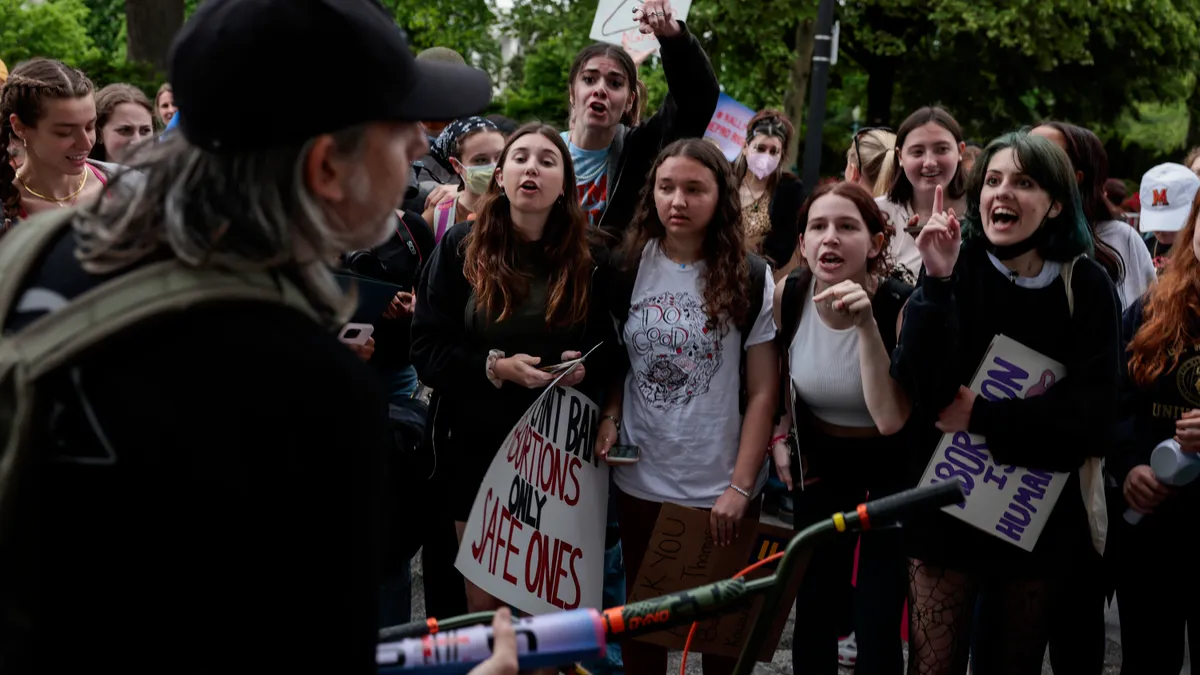Editor’s note: In light of today’s Supreme Court decision to overturn Roe v. Wade, we're republishing this article on the impact abortion access has on K-12.
If the landmark Supreme Court case Roe v. Wade is overturned as expected, students in at least 13 states would face restrictions in choosing abortion — something that could have an impact on high school dropout and graduation rates.
"For young people — people who are in high school, in college — it's really important to help them plan and space pregnancies according to their own goals, so that they can achieve their educational goals," said Rachel Fey, vice president of policy and strategic partnerships at Power to Decide, a campaign to prevent unplanned pregnancy.
Prior to Roe, unwed pregnant teens who gave birth were 16 percentage points more likely to drop out of high school compared to those who miscarried, according to a 2015 study on teens conceiving from 1940 through 1968, published in American Economic Journal: Applied Economics.
"That's a big number," said Kevin Lang, co-author of the study and professor of economics at Boston University. It's important to note that teen motherhood isn't the primary cause of lower education attainment, rather it is associated with it, Lang said.
Lang found that teens who were more likely to experience adverse impacts from motherhood were also more likely to avoid them by marrying early, refraining from premarital sex or operating under the assumption that premarital conception would result in marriage.
"All of these 'solutions' would make it less likely that the teen would finish high school," Lang said. "You can imagine that the 'cost' of these solutions was highest for girls who were otherwise college bound and lowest for those who never planned to finish high school."
Times have changed since then — a significantly large proportion of women who face unplanned pregnancies are unmarried and oral contraception is widely available. And women who are more likely to graduate from high school and would have the largest adverse effects from unplanned pregnancies are now also more likely to avoid motherhood through contraception, abortion or other means, Lang added.
"And the real question — which I can't tell you the answer to — is how much they will be able to do that in a world in which abortion is outlawed in a very large fraction of the states," Lang said.
A separate study, commonly referred to as The Turnaway Study, shows that women who were turned away from abortion and went on to give birth experienced an increase in household poverty lasting at least four years compared to those who had an abortion.
"One of the things we see is that people struggle to climb out of poverty. And educational attainment is connected to that," said Fey.
However, even with potential restrictions in some states, students with the means to travel outside of state borders may still be able to access abortion care. "It's not that abortion will go away, it's that who is able to access it will be more stratified along racial and economic lines," Fey said. Those who are living in the U.S. without legal permission or are low-income, Black or brown would be among those less likely to travel out of state for an abortion, she said.
In that way, many of the same student subgroups who are already lagging in academic achievement are also less likely to be able to access abortion care.
High school completion 'certainly not impossible'
In some places, schools have sought to support teen mothers in graduating from high school.
"It is certainly not impossible to complete your education as a parent," Fey said. "And we've seen lots of examples of that."
For instance, some high schools offer child care so teenage mothers can attend class.
In Kentucky's Hardin County Schools, the ExCEL program provides access to on-site child care and door-to-door transportation for both teenage mothers and their children.
Teenage mothers on track to receive their high school diploma also participate in a hands-on parenting program with their child for part of each school day that counts toward elective course credit for their diploma, said Wes Blair, director of alternative programs for the district.
The program, funded by the district with additional grant funds from a local foundation, can serve up to 10 students at a time. Teenage mothers are put on a nontraditional diploma track, with students entering and exiting the program throughout the year.
During the 2021-22 school year, the program has served a total of 11 students, with five of those students completing their high school diploma and exiting the program.
"Obviously teenage pregnancy can occur in any time of the year ... so it's a fluid roster," Blair said. He added the number of seats available in the program currently meets the needs of the community.
"The goal of that program is to prevent barriers from students to complete their high school diplomas — those are childcare and also the mother not wanting to be away from their child — so we try to bridge those gaps," Blair said. "Knocking those two barriers down usually is what keeps the kid coming to school and completing their diploma."
Some of the teen mother graduates have gone on to enter the education profession themselves, Blair said.
The Guttmacher Institute, a nonprofit organization that tracks abortion policy, has estimated that over half of states are likely to ban abortion if Roe v. Wade is overturned. Kentucky is included in that list.
'How do you become a resource?'
Schools looking to help students now, with Roe hanging in the balance, should understand the current laws and changes in their states to help students navigate their options when needed, suggested Fey.
"It's a question of resources," Fey said. "So how can you become a resource to them, to route them to those places where they can go for help?"
In some places, community support and awareness may be helpful. Students, for example, have already staged walkouts and protests to raise awareness in the wake of the released draft Supreme Court opinion suggesting the impending repeal of Roe v. Wade.
Students could also receive support from school counselors, psychologists or trusted teachers or other staff members.
"I think, in some places, that would be helpful. And other places, you're likely to run into a lot of hostility towards that," Fey said. "And you don't want to exacerbate or put young people in a worse situation than they would be if they were just able to go to a trusted teacher, guidance counselor or someone and feel that they were safe going to that person."
Should students travel outside of state borders to receive abortion care, it would be a matter of local district practice and policy whether remote or distance learning could be offered, said Hedy Chang, founder and executive director of Attendance Works, which aims to reduce chronic absenteeism.
"I suspect students missed a lot of school if they had an abortion, whether it was in-state or out of state, given the physical and emotional toll they take," Chang said.




















